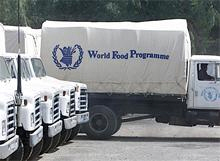
Typical street scene in Santa Ana, El Salvador. (Photo: iStock)
IMF Survey: IMF Evaluates Its Involvement With Fragile States
April 1, 2008
- Review says IMF has, in most cases, succeeded in helping fragile states
- Some countries seeking support needed clear signal from IMF about prospects
- Medium-term approach could better adjust IMF support to country constraints
An IMF Executive Board discussion concluded that the Fund's engagement with fragile states, while broadly positive, left space for improvement.

Fragile states account for more than one-quarter of world's poor, receive less aid than warranted by economic, social needs (photo: Zainal Abd Halim/Reuters)
INTERNATIONAL SUPPORT FRAMEWORK
The Board supported a more gradual and systematic approach to economic reforms in countries affected by conflict and hampered by weak governance and limited capacities. Such an approach should be underpinned by clearly prioritized technical assistance to rebuild capacity. The IMF also needs to provide clear signals to other agencies and donors about the country's macroeconomic performance and prospects.
The Board's March 24 review considered a paper on the Fund's engagement in fragile states and post-conflict countries, where economic and social performance are impaired by social tensions, occasional conflicts, and weak governance and administrative capacity. The discussion took place in the context of increased international attention to the problems of fragile states, and the development of a concerted international framework for providing support to these countries.
Economic, social needs
Based on a number of indicators, the World Bank recently categorized 35 countries as fragile states. These countries, accounting for 27 percent of the world's poor, receive less aid than warranted by economic and social needs, lag behind other low-income countries in terms of economic performance, and are least likely to achieve the Millennium Development Goals.
While recognizing that agencies such as the UN and the World Bank are expected to lead in assisting fragile states to address their social and infrastructure needs, the Executive Board underscored the Fund's crucial role in providing technical assistance and policy advice on macroeconomic issues.
Positive results so far
The paper notes that the Fund has, in most cases, succeeded in helping fragile states improve their economic management and performance. Technical assistance was most effective when tailored to the countries' implementation constraints.
Most countries managed to tame high inflation (a tax that affects mostly the poor) and initiated a period of economic recovery. In some cases, the Fund also provided low-interest loans that helped countries increase external financing and get access to debt relief.
Gaps identified
However, the review also notes that fragile states had weaker performance in implementing economic programs compared with other developing countries, and that they needed more time to stabilize their economies. These countries experienced extreme difficulties in implementing structural reforms.
Furthermore, countries where the Fund did not extend loans were often unable to mobilize sufficient external support, partly because of lack of a clear signal from the Fund about the country's prospects. The main lesson is that fragile states need a differentiated approach with respect to technical assistance, economic policies, and reforms.
Weak administrative capacity and dysfunctional economic institutions require careful prioritization of technical assistance, based both on a diagnostic of the countries' overall needs and their capacity to use the assistance effectively. Optimal economic policies may not be feasible until implementation capacity has been sufficiently strengthened.
Moreover , the scope of early economic reforms undertaken in these countries should focus on few critical areas to avoid overburdening that limited capacity-- other important reforms, including some necessary structural measures, need to be postponed to a later date.
Changes in the approach
The Board supported the conclusions of the review that a more systematic and graduated approach could improve the effectiveness of the Fund's engagement with fragile states. Such an approach could be embedded in a medium-term framework that adjusts IMF policy advice, capacity building, and financial assistance to each country's constraints.
In this context, the Board considered whether there is a need to formalize this new approach into a proposed "Economic Recovery Assistance Program" that would run in two phases over a number of years. The first phase would focus on technical assistance and economic policy advice with semi-annual assessments of the country's performance, and the second phase would involve low-interest financing from the Fund, and could contribute to building a track record for eventual debt relief.
While many Directors saw merit in introducing a new formal framework, other Directors considered that the existing toolkit of IMF support, including Staff-Monitored Programs and Emergency Post-Conflict Assistance, were sufficient to accommodate a more systematic and gradual approach to assist fragile states in the future. A final decision about changes to the Fund's mode of engagement with these countries will be taken at a subsequent Board meeting later this year.







